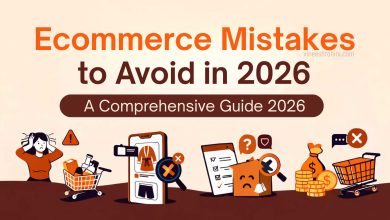7 Best Ecommerce Platforms for Small Businesses: Empowering Online Success
In today’s digital age, having a robust online presence is crucial for small businesses to thrive. Ecommerce platforms provide the necessary tools and features to create, manage, and grow an online store. This essay aims to explore the seven best ecommerce platforms for small businesses.
Also Read… Top 5 New Transcription Jobs Online
We will delve into their features, pricing, customization options, ease of use, and support, enabling entrepreneurs to make informed decisions when choosing the right platform for their online venture.
- Shopify: Shopify is a popular ecommerce platform known for its user-friendly interface and extensive range of features. It offers a variety of templates, customization options, and secure payment gateways. With built-in SEO tools, inventory management, and marketing integrations, Shopify provides an all-in-one solution for small businesses. Additionally, Shopify’s 24/7 customer support ensures that merchants receive timely assistance whenever needed.
- WooCommerce: WooCommerce, a WordPress plugin, empowers businesses to transform their websites into fully functional online stores. It offers seamless integration with WordPress, providing a flexible and customizable platform. WooCommerce provides a wide range of extensions, themes, and payment gateways, allowing businesses to tailor their online stores to their specific needs. Furthermore, it offers robust inventory management and shipping options, making it suitable for businesses of all sizes.
- BigCommerce: BigCommerce is a comprehensive ecommerce platform that caters to small and mid-sized businesses. It boasts a user-friendly interface, powerful selling tools, and a range of responsive templates. BigCommerce offers advanced SEO features, built-in analytics, and multi-channel selling capabilities. With secure hosting and scalability options, it provides a reliable and scalable solution for businesses looking to expand their online presence.
- Magento: Magento is an open-source ecommerce platform that offers exceptional flexibility and customization options. It is suitable for businesses with more advanced technical requirements and larger product catalogs. Magento provides robust features for inventory management, marketing, and customer segmentation. While it requires more technical expertise to set up and maintain, it offers a high level of control and scalability for businesses aiming to grow.
- Squarespace: Squarespace is a popular website builder that also offers ecommerce functionality. It combines visually appealing templates with easy-to-use tools, making it an ideal choice for creative businesses. Squarespace provides features such as inventory management, flexible product variants, and secure payment options. With its intuitive interface and reliable customer support, it enables small businesses to create stunning online stores with ease.
- Volusion: Volusion is an ecommerce platform designed specifically for small businesses. It offers a range of customizable templates, intuitive drag-and-drop design tools, and secure payment gateways. Volusion provides essential features like inventory management, order tracking, and social media integrations. It also offers built-in SEO tools to help businesses rank higher in search engine results.
- Wix: Wix is a popular website builder that also includes ecommerce capabilities. It offers a wide selection of professional templates and an intuitive drag-and-drop editor. Wix provides features like secure online payments, inventory management, and multichannel selling options. With its user-friendly interface and extensive app market, small businesses can create visually appealing and functional online stores.
Also Read…Best 3 Data Entry Jobs To Earn 1000 Rs Daily
Conclusion:
Selecting the right ecommerce platform is crucial for small businesses to succeed in the competitive online marketplace. Each of the seven platforms discussed—Shopify, WooCommerce, BigCommerce, Magento, Squarespace, Volusion, and Wix—offers unique features, customization options, and support systems. By evaluating their specific needs, budget, and technical expertise, entrepreneurs can choose the platform that aligns best with their business goals. Leveraging the power of these ecommerce platforms, small businesses can establish a strong online presence, drive sales, and achieve



